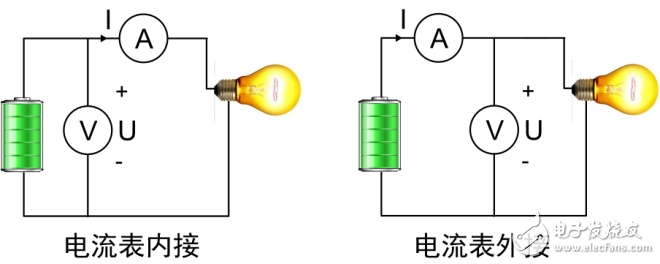The following figure shows the two methods of internal and external connection of ammeter.

For power measurement instruments, we want the input impedance of the voltage channel to be infinite, and the input impedance of the current channel is infinitesimally small. However, there is always a gap between reality and ideal. The input impedance of the voltmeter and ammeter consumes the electrical energy in the measurement loop, which produces systematic errors. The influence on the measurement accuracy is related to the measurement method.
1. Calculate the power loss of the voltage and current meters under different conditions before deciding which method to use.
Regardless of the internal and external connections, the power we read from the instrument is 
Ammeter loss 
Voltmeter loss 
Where RI and RU are the internal resistances of the voltmeter and ammeter, respectively. Get two conclusions from the picture:
(1) When the ammeter is connected, the ammeter reading is the load current. The voltmeter reading is the sum of the resistance drop and the load voltage in the ammeter. Therefore, the measurement result of the instrument includes the loss power PI of the ammeter.
(2) When the ammeter is externally connected, the ammeter reading is the sum of the load current and the voltmeter current, and the voltmeter reading is the load voltage, so the instrument's measurement result includes the watt-hour loss power PU.
2. Compare the losses of the two connections in a specific environment.
(1) It may be assumed that the voltmeter loss is greater than the ammeter, which is derived from the inequality operation rule: 
(2) Similarly, the voltmeter loss is less than the ammeter: 
(3) When the two are equal: 
We will temporarily refer to the square root of the voltmeter and current meter resistance product as the "power characteristic impedance" of the instrument, RP. 
According to the calculation results of the above three cases, the effects of different load impedance RL and power characteristic impedance RP are as follows:
(1) RL RP voltmeter loss is large;
(2) RL "RP current meter loss is large;
(3) RL = RP loss is equal.
3, choose the appropriate connection to improve measurement accuracy
The above analysis of the loss of the meter under different load impedance and power characteristic impedance, which one to choose? Need to be selected according to the measurement object. Taking the efficiency of the test DC-DC converter as an example, it is necessary to measure the converter input power and output power. The input power is the power absorbed by the converter. The loss of the meter should be minimized. Therefore, the meter with low loss needs to be connected internally to eliminate the power of the meter with large loss. The output power is the power provided by the converter. The meter loss and the load power are provided by the converter. To calculate the power loss of the meter into the converter output power, the meter with high loss is internally connected.
Set DC-DC input voltage 48V current about 0.3A, output 12V current about 1A, output 12Ω dummy load. Using the PA5000 power analyzer 5A power card measurement efficiency, voltage channel input impedance 2MΩ, current channel sampling resistance 0.1Ω, first power characteristic impedance: 
The output load impedance is 12Ω “447Ω. According to the conclusion (2), the ammeter will consume more power. Therefore, the measured output power should be connected to the ammeter. The DC-DC output power measured by the PA5000 includes the current consumption of the ammeter.
Input load impedance RIN=48/0.3=160Ω “447Ω, according to conclusion (2) In this case, the ammeter will consume more power, so the current meter should be connected externally, and the large loss of the ammeter will not be counted in the DC-DC input power. It is.
The input and output wiring is as shown in the figure below, and the system error of input and output power is smaller.

If you see a headache, the PA5000 has a more advanced wiring compensation function, no manual calculation.
Fuse Holder,Car Fuse Holder,Maxi Fuse Holder ,Fuse Tap
Dongguan Andu Electronic Co., Ltd. , https://www.autoido.com